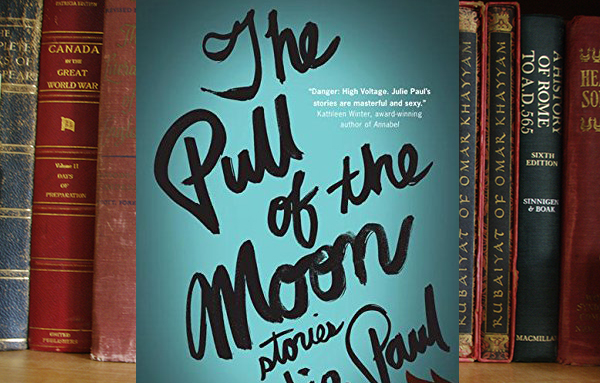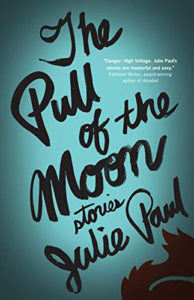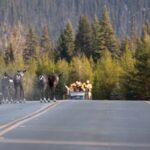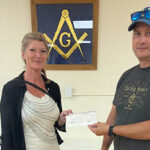Home »

Julie Paul uses the short story form to her advantage
Book Review
By Derryll White
 Paul, Julie (2014). The Pull of the Moon.
Paul, Julie (2014). The Pull of the Moon.
This is Julie Paul’s second collection of short stories. She is on her form. The language in all 12 stories is clear and direct. As I read, I know she is talking to me because almost all of this stuff, the substance of her stories, has happened to me.
Julie Paul has a very clear voice – unpretentious, direct, and accessible. She uses that voice to pry open and examine some of the common taboos of our time. Overblown pet funerals, children that are so special and partners needing to bail from a relationship so that they can find themselves are only some of the targets Paul zeros in on. And she is very funny, zoning in on several male propensities the way only astute women can.
Paul uses the short story form to her advantage, allowing her stories to veer and to shoot off into unseen catacombs. She knows she can pull the reader back with unlikely bridges that would be an engineering disaster in the longer novel form. And Julie Paul is good enough as a storyteller that she relishes this freedom. Her characters don’t have a long life, but they burn so brightly.
The “Emp” came particularly close. I also had a father with a propensity to drink, a lot. Paul required me, insistently, to go back through those times. I have found that the self-editing functions of memory are particularly useful when reading an author like Julie Paul. These seemingly inconsequential stories take the reader close to the bone, and require thought and reflection. I liked Julie Paul, a lot.
********
Excerpts from the book:
DOWNTIME – He lay in his chair and watched the clouds racing across a book-blue sky as if being hounded by salesmen. These clouds seemed to have internal desires, changing as they passed, from animal to gargoyle to spirals, a bit of pure blue above him before the next morphing creature came along. They made him feel useless, inert as a stick. He closed his eyes. Jim knew it was the wind against his eyelids, but it felt like the clouds were brushing him as they streamed past. Better if he kept an eye on them, to know where they were.
PARENTING – Maybe some people could do it, bring babies up the right way. Maybe parenting did involve studying, although he found that hard to believe. Shouldn’t raising a child be innate? Shouldn’t it be second nature, animals bringing up their own? Survival of the species, all that?
AFTER? – “Oh, Lord.” She was worse off than he’d thought. “The poor cat’s gone, Gwennie. He won’t know where he’s buried.”
“Exactly,” she said. “We don’t know what happens after we die do we? Well what if we rise out of our graves and live again? Wouldn’t it be better if we knew where we were?”
LIFE – Gwen had moved down to Portland when she was in her forties, deep in an affair with a man who’d told her she was a goddess. Then, after marrying her and eating through her money like a termite, he left her for another goddess, and she was stuck in the United States with a great waitressing job and no love.
CONSERVATION – Sedona’s a centre for tuning in. I needed to expand my chakras, flush my channels, tune into the universe. Warren used to think it was cute, the way I believed in all this stuff, but then he went sad and mopey when I told him he should try to save his sexual energy instead of always spend, spend, spend. I was just trying to make him a stronger man.
TITLE – I thought about the moon, a lot. I followed this astrologer on the west coast of B.C., receiving her daily text updates about what to do or what not to do based on what was going on with the moon. People were under the lunar spell, she wrote; every earthling went through each day pulled by lunar strings. One day might not be a good day for real estate or financial planning – moon in Scorpio – but once the next morning came, boom! Buy that house.
TATTOOS – As for me, when I wasn’t working, or had no new boyfriend in the bed, my days were empty vessels; I’d begun to think that getting tattoos was intimate – the buzz, the pain, the blood, the scarring – and at Least I was left with something I wanted to see again. I was only twenty-seven but I was lonely.
BOOKS – Maddie was waiting for him, sitting on the back fence around the school yard, head bent over a book. She was looking up from time to time for him – he watched her for a minute before getting out of the car and walking up the street – but she didn’t appear worried. A book is better than a friend, she told him once, and he’d felt both bereft and very pleased, in equal parts.
 – Derryll White once wrote books but now chooses to read and write about them. When not reading he writes history for the web at www.basininstitute.org.
– Derryll White once wrote books but now chooses to read and write about them. When not reading he writes history for the web at www.basininstitute.org.







